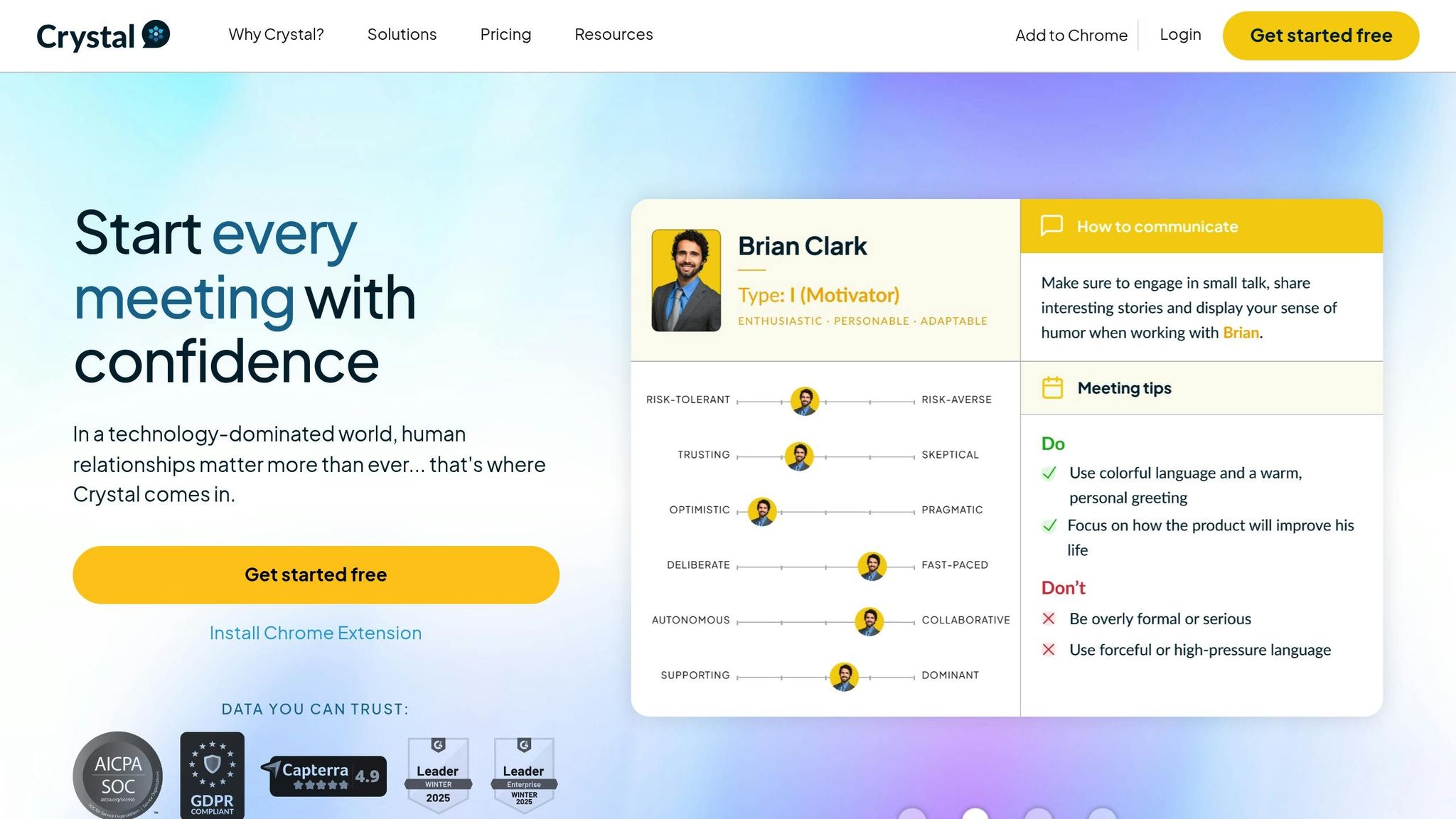- Why it matters: AI-powered tools help businesses create tailored customer interactions, boosting engagement and reply rates by up to 40%.
- Core features:
- Data Analysis: Understand customer behavior and preferences.
- Mass Personalization: Send customized messages at scale.
- Real-Time Assistance: Get instant suggestions during sales calls.
- Top tools to explore:
- Crystal: Analyzes personality traits to improve communication.
- Smart CRMs: Automate data management and identify high-value leads.
- AI Sales Call Assistants: Provide live feedback during calls.
- AI Outreach Tools: Automate and optimize follow-ups.
Quick Tip: To get started, organize your customer data, integrate AI tools with your CRM, and train your team to leverage AI insights effectively.
Changing the Sales Game with AI & Personalization
Core Functions of AI Sales Tools
AI sales tools are reshaping how businesses interact with customers by offering insights, personalized messaging, and real-time assistance.
Customer Data Analysis
These tools dig into customer data, such as purchase history and interaction patterns, to create insights that help craft personalized messages. For example, Saleshandy's AI-powered email automation tool uses this data to fine-tune email content and timing for better results [1].
Mass Personalization
Using detailed data analysis, AI tools now make it possible to personalize messages on a large scale. Instead of generic mass emails, businesses can create tailored messages for each customer. Some key features include:
- Dynamic content generation that aligns with individual preferences
- Smart scheduling to send messages at optimal times based on customer behavior
Sales Conversation Support
During live conversations, AI tools analyze the flow of dialogue and provide instant suggestions. By leveraging earlier insights from data analysis and personalization, these tools improve real-time interactions.
"AI-powered tools can automate sales follow-ups, nurturing leads, and scheduling meetings for teams." - AgileGrowthLabs.com [1]
Here are some standout features of these tools:
| Feature | Function | Benefit |
|---|---|---|
| Live Analysis | Tracks tone and sentiment in conversations | Helps sales reps adjust their approach instantly |
| Content Suggestions | Recommends materials and responses | Ensures accurate and consistent communication |
| Follow-up Automation | Schedules and sends personalized follow-ups | Keeps customers engaged without extra effort |
Best AI Sales Personalization Tools
Crystal - Personality Sales Tools

Crystal uses AI to analyze communication patterns and personality traits, helping sales teams create more personalized approaches. It provides insights into how prospects prefer to communicate, making it easier to craft messages that resonate.
Key features include:
- Real-time personality assessments based on digital activity
- Communication style suggestions for emails and calls
- Team collaboration tools to share insights about prospects
- CRM integration with major platforms
Smart CRM Systems
AI-powered CRM platforms simplify data management and help identify high-value prospects. By using machine learning, these systems automate repetitive tasks, allowing sales teams to focus on building relationships and improving efficiency.
AI Sales Call Assistants
These tools offer real-time guidance during calls, providing instant suggestions and feedback to help sales reps adjust their strategies. Integrated into CRM workflows, they help maintain effective and personalized conversations, ensuring customer interactions are productive and well-targeted.
AI Sales Outreach Tools
AI outreach tools automate and customize communication with prospects on a large scale. By analyzing customer data, they determine the best times to reach out and handle follow-ups, making lead nurturing more efficient [1].
Top SaaS & AI Tools Directory
Looking for a comprehensive resource for AI sales tools? The Top SaaS & AI Tools Directory connects businesses with solutions for lead generation, sales optimization, and marketing automation. It’s a go-to platform for discovering tools tailored to:
- Email automation and verification
- Customer data analysis
- Sales process optimization
- Lead generation automation
- Real-time conversation insights
These resources make it easier for businesses to find the right tools to enhance their sales personalization strategies [1].
sbb-itb-9cd970b
How to Use AI Sales Tools
Preparing Your Data
To make the most of AI sales tools, start with well-organized and clean data. Here's how to structure your information:
- Standardize contact details: Ensure names, addresses, phone numbers, and emails follow a consistent format.
- Categorize customer interactions: Label activities like "product demo", "pricing discussion", or "support request" for easy tracking.
- Segment your customers: Group them by factors such as industry, company size, purchase history, and engagement level.
- Record communication preferences: Note preferred contact methods, typical response times, and preferred communication styles.
Once your data is in order, integrating AI into your sales tools becomes much smoother.
Linking AI to Your Sales Tools
Connect AI to your existing sales tools by following these steps:
CRM Integration
- Sync data between your AI tools and CRM in both directions.
- Automate data validation to eliminate errors.
- Add custom fields to display AI-driven insights.
- Set up real-time updates for seamless information flow.
Email Platform Connection
- Install necessary plugins or APIs to link AI with your email platform.
- Enable email tracking and response analysis for better insights.
- Add personalization tokens to tailor emails to individual recipients.
- Set up automated follow-up sequences to save time.
Training Your Team on AI Tools
Getting your team comfortable with AI tools is key to their success. Focus on these training areas:
-
Understanding AI Basics
Help your sales team understand how AI processes data and provides recommendations. This builds confidence in the tool and encourages them to use it effectively. -
Tool-Specific Training
Walk through each tool’s workflow, including how to:- Access and interpret AI-generated insights.
- Use personalization suggestions to improve customer interactions.
- Leverage AI-generated content like emails or proposals.
- Monitor and analyze results.
-
Establishing Best Practices
Create clear guidelines for:- Deciding when to rely on AI versus human judgment.
- Customizing AI suggestions to fit specific scenarios.
- Providing feedback to improve the AI's accuracy.
- Measuring the performance and impact of AI tools on sales outcomes.
Conclusion
AI-driven tools for sales personalization are transforming how businesses engage with customers and manage sales workflows. By leveraging data analysis, large-scale personalization, and real-time assistance, these tools boost both sales team efficiency and customer interactions. To make the most of these advancements, businesses should focus on a few key steps.
To get started with AI in sales personalization:
- Organize your customer data: Ensure your data is well-structured and ready for AI to analyze effectively.
- Start with essential features: Focus on solving immediate sales challenges using basic AI capabilities before scaling up.
- Provide team training: Equip your staff with the skills needed to use these tools effectively and maximize their potential.
Combining AI automation with human expertise enables businesses to deliver efficient, personalized sales experiences. This approach ensures companies can fully capitalize on the opportunities AI-driven personalization offers.
FAQs
How do AI tools enhance sales personalization?
AI tools transform sales personalization by analyzing customer data to create tailored communication strategies. They help businesses understand individual preferences, buying behaviors, and pain points, enabling more relevant and engaging interactions.
These tools also streamline lead generation and sales optimization by automating repetitive tasks, identifying high-value prospects, and delivering insights that drive smarter decision-making. With AI, sales teams can focus on building stronger customer relationships while achieving better results.
How can businesses seamlessly integrate AI tools with their current CRM systems?
To integrate AI tools with your existing CRM system effectively, start by identifying the specific goals you want to achieve, such as improving lead scoring, automating customer interactions, or enhancing sales forecasting. Next, ensure the AI tool you choose is compatible with your CRM platform and supports seamless data sharing. Most modern AI tools offer built-in integrations or APIs to simplify this process.
Once integrated, focus on training the AI system using your existing customer data to ensure accurate predictions and insights. Regularly monitor performance and make adjustments to optimize the AI's effectiveness. This approach ensures smooth adoption and maximizes the value of AI-driven personalization in your sales processes.
What kind of training do sales teams need to effectively use AI-driven personalization tools?
To maximize the benefits of AI-driven personalization tools, sales teams should focus on training in three key areas:
- Understanding AI capabilities: Teams need to learn how AI tools work, including their features and limitations, to use them effectively in personalizing customer interactions.
- Data interpretation and usage: Training on how to analyze and apply customer data insights generated by AI tools is essential for tailoring communications and strategies.
- Tool-specific training: Familiarity with the specific software being used, including hands-on practice and understanding its workflows, ensures smooth integration into daily sales processes.
Ongoing training and support can help teams stay updated as tools evolve, ensuring consistent improvement in sales personalization efforts.



